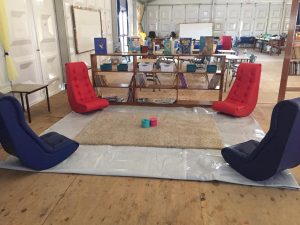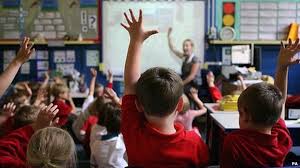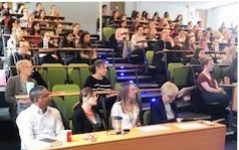Kimberly George’s miracle among historic hurricane devastation
Having spent a year away from home studying for a master’s in Education at the University of Reading, Kimberly George was excited to be returning to her home in the British Virgin Islands (BVI). Finally she would rejoin her family and take up her new post as head of a high ranking local primary school. As she contemplated the future she’d worked so hard to achieve, Kimberly could have been forgiven a quiet optimism. She was looking forward to the challenges of her new role and the growth she could share with her pupils.
Then the most powerful Atlantic hurricane ever recorded hit land and ran an almost straight course through the British Virgin Islands.
Such was the annihilation caused by Hurricane Irma, even the few trees that survived the onslaught found themselves shivering, stripped of every scrap of bark. Boats, cars, shipping containers and roofs performed a bizarre danse macabre as they cartwheeled around the islands.
And then, less than two weeks later, the islands were hit for a second time by Hurricane Maria.
“Down but not out,” said the authorities as they clawed their way out of rubble and onto Twitter.

The situation Kimberly walked into was one she could never have imagined. Her island home was flattened. The school for which she was about to assume Headship, the Bregado Flax Educational Centre (Primary), was utterly devastated, filled with filthy flood water, its books, desks and chairs reduced to pulpy landfill.
Kimberly was faced with one of the most challenging situations a new Principal could imagine. While her section of the school could conceivably return to use, this would take extensive repairs over a number of years. And her pupils were waiting for her to open their school for the new term, desperate for a sense of normality to return.
Kimberly had to find a temporary primary school for her charges. There was also a desperate need for equipment and teaching materials. Above all else, locals who wished to help were themselves traumatised, often bereaved and in a state of shock and grief for the pain that had been inflicted on their paradise.
In November 2017, just after the Hurricane, Kimberly said:
“We have been hit really badly … the BVI is quite devastated now. No communication or anything. Most persons have lost everything. And are leaving the country. My family is well. We lost our roof and the things in our home but we are alive. Thank God. But we have lost more than half the schools in the territory.”
 Today, less than four months after we last spoke, Kimberly and her cohorts have wrought no less than a miracle. Her school is a happy, clean, charming place, its cheerful atmosphere belying its home in a temporary hardbody tent.
Today, less than four months after we last spoke, Kimberly and her cohorts have wrought no less than a miracle. Her school is a happy, clean, charming place, its cheerful atmosphere belying its home in a temporary hardbody tent.
 Kimberly reports:
Kimberly reports:
“As a team we have been making tremendous strides with getting students back to a sense of normality. We have received many generous donations from all around the world to get our students back on track with learning. They have been settling well and are happy to be in school.”
With her particular brand of serene resilience, she continued:
“Although challenging, I am happy that I became principal at this moment in time because I continue to learn and develop my skills in patience and resilience and I am proud to be giving back to my community in the field of education at a time such as this.”
The Institute of Education is also proud; proud of our MA graduate Kimberly George, who took her newly earned knowledge back home, faced unimaginable challenges and hardships and rose above them to give her community a school they deserve. That is why Kimberly is the IoE’s Icon of International Women’s Day 2018.
Kimberly’s tutor at the IoE, Dr Helen Bilton said:
“It was a great pleasure to have taught and worked with Kimberly. She is a strong, influential and inspiring figure, as was plain during her time with us, and as has become clearly evident in her calm management of a nearly impossible situation in the aftermath of the devastating events in the British Virgin Islands. At the IoE, we are all wholeheartedly behind her in her remarkable efforts.”
 You are warmly invited to the 5th annual The Reading Guild of Artists (RGA) Summer Show at the Institute of Education: Art building L04: June 14th to 24th, 10-4 (includes Saturday and Sunday opening). This year the show includes an amazing selection of extremely accomplished and eclectic works that cannot fail to inspire, as well as workshops and activities. run by the RGA
You are warmly invited to the 5th annual The Reading Guild of Artists (RGA) Summer Show at the Institute of Education: Art building L04: June 14th to 24th, 10-4 (includes Saturday and Sunday opening). This year the show includes an amazing selection of extremely accomplished and eclectic works that cannot fail to inspire, as well as workshops and activities. run by the RGA 

 The tuition-fee funded Primary School Direct programme could be for you. This route allows you to:
The tuition-fee funded Primary School Direct programme could be for you. This route allows you to: The Improving Equity and Inclusion through Education (IEIE) Research group recently welcomed guest speaker, Lærke Testmann, to the Institute of Education. Laerke travelled to Reading from The Danish School of Education, Aarhus University in Copenhagen, Denmark, especially to present her research on “Children’s communities in school – perspectives on inclusion” – a project that investigates how children collaborate on organizing their social life in school in communities. Laeke explained the project involved:
The Improving Equity and Inclusion through Education (IEIE) Research group recently welcomed guest speaker, Lærke Testmann, to the Institute of Education. Laerke travelled to Reading from The Danish School of Education, Aarhus University in Copenhagen, Denmark, especially to present her research on “Children’s communities in school – perspectives on inclusion” – a project that investigates how children collaborate on organizing their social life in school in communities. Laeke explained the project involved:


 demonstrate their commitment to their trainees.
demonstrate their commitment to their trainees. 

 Today, less than four months after we last spoke, Kimberly and her cohorts have wrought no less than a miracle. Her school is a happy, clean, charming place, its cheerful atmosphere belying its home in a temporary hardbody tent.
Today, less than four months after we last spoke, Kimberly and her cohorts have wrought no less than a miracle. Her school is a happy, clean, charming place, its cheerful atmosphere belying its home in a temporary hardbody tent. Kimberly reports:
Kimberly reports: